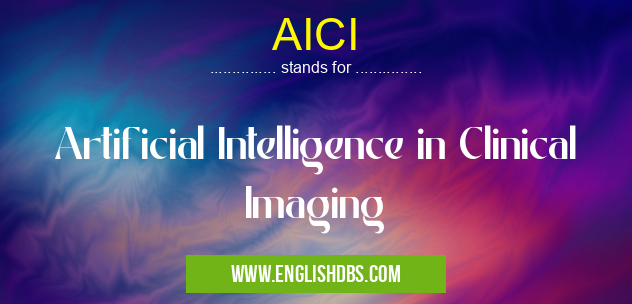What does AICI mean in PHOTOGRAPHY & IMAGING
AICI stands for Artificial Intelligence in Clinical Imaging. It is a rapidly growing field that uses machine learning and deep learning algorithms to analyze medical images and extract valuable information for clinical decision-making. AICI has the potential to revolutionize the way healthcare professionals diagnose and treat diseases, leading to improved patient outcomes and reduced costs.

AICI meaning in Photography & Imaging in Miscellaneous
AICI mostly used in an acronym Photography & Imaging in Category Miscellaneous that means Artificial Intelligence in Clinical Imaging
Shorthand: AICI,
Full Form: Artificial Intelligence in Clinical Imaging
For more information of "Artificial Intelligence in Clinical Imaging", see the section below.
Applications of AICI
AICI has a wide range of applications in clinical imaging, including:
- Computer-aided diagnosis (CAD): AICI algorithms can assist radiologists in detecting and characterizing lesions or abnormalities in medical images. CAD systems can improve diagnostic accuracy and reduce false positives.
- Image segmentation and registration: AICI can be used to segment medical images into different anatomical structures or tissues, which is essential for accurate diagnosis and treatment planning.
- Image reconstruction: AICI algorithms can improve the quality of medical images by reducing noise and artifacts, resulting in clearer and more informative images.
- Radiomics: AICI can extract quantitative features from medical images, known as radiomic features, which can be used for disease classification, prediction, and treatment response evaluation.
Benefits of AICI
The use of AICI in clinical imaging offers numerous benefits, such as:
- Enhanced diagnostic accuracy: AICI algorithms can provide objective and consistent analysis of medical images, leading to improved diagnostic accuracy and reduced inter-observer variability.
- Time savings: AICI can automate time-consuming tasks, such as image segmentation and analysis, freeing up radiologists to focus on more complex cases and patient interaction.
- Improved patient outcomes: By providing more accurate and timely diagnoses, AICI can help improve patient outcomes and reduce the risk of misdiagnosis or delayed treatment.
- Reduced healthcare costs: AICI can help reduce healthcare costs by streamlining diagnostic processes, reducing unnecessary procedures, and optimizing treatment plans.
Essential Questions and Answers on Artificial Intelligence in Clinical Imaging in "MISCELLANEOUS»PHOTOGRAPHY"
What is Artificial Intelligence (AI) in Clinical Imaging?
AI is the use of algorithms to analyze, interpret, and classify medical images. It can provide valuable information that can aid in diagnosis, treatment planning, and prognosis.
What are the benefits of using AI in clinical imaging?
AI can improve image quality, automate tasks, and assist in making diagnoses. It can also help identify patterns and correlations that humans may miss, leading to earlier and more accurate diagnosis.
What are some specific applications of AI in clinical imaging?
AI is used in a wide range of clinical imaging applications, including:
- Medical image analysis: AI can automatically segment and analyze medical images, providing quantitative measurements and insights.
- Disease detection and diagnosis: AI algorithms can identify patterns and subtle abnormalities in medical images, aiding in early detection and diagnosis of diseases such as cancer and cardiovascular disease.
- Treatment planning and monitoring: AI can assist in optimizing treatment plans and monitoring patient response to therapy. For example, it can help determine the optimal dose of radiation for cancer treatment or predict the likelihood of a patient developing complications.
Is AI replacing radiologists?
No. AI is a tool that can assist radiologists by automating tasks, providing additional insights, and improving the accuracy of diagnoses. Radiologists will continue to play a crucial role in interpreting medical images and making clinical decisions.
What are the ethical considerations for using AI in clinical imaging?
The use of AI in clinical imaging raises ethical concerns such as data privacy, bias, and transparency. It is important to ensure that AI algorithms are developed and used responsibly, with appropriate oversight and safeguards in place.
Final Words: AICI is a transformative technology that is revolutionizing the field of clinical imaging. Its ability to analyze medical images with unprecedented accuracy and efficiency has the potential to improve patient care, reduce healthcare costs, and advance the development of new therapies. As AICI continues to evolve, it is expected to play an increasingly significant role in the diagnosis and management of diseases.
AICI also stands for: |
|
| All stands for AICI |
